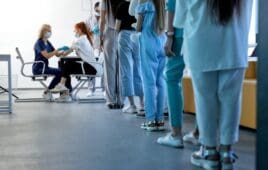
[Image from National Cancer Institute via Unsplash]
The Advisory Committee on Immunization Practices (ACIP) within the CDC met yesterday to discuss how to best allocate COVID-19 vaccines. Members of the group will formalize their recommendations by voting after FDA approves or authorizes COVID-19 vaccines. CDC will then look to that guidance as it creates recommendations for immunization schedules.
Achieving the committee’s goal of immunizing healthcare workers first may not be as straightforward as it seems. Some healthcare workers are hesitant about receiving a COVID-19 vaccine, mirroring a broader trend across the public.
A recent survey of healthcare workers in Los Angeles found that 66.5% actually plan to hold off on getting vaccinated. Reasons for the intent to delay include evolving SARS-CoV-2 science (76.0%), the current political climate (57.6%) and the rapid pace of COVID-19 vaccine development (83.4%).
Nurses in the study were 4.15 times more likely to intend delaying their vaccination while other workers in patient-contact roles were 2.45 times more likely to do so.
A poll in New Jersey found that only two-thirds of doctors and 47% of nurses would be willing to take the COVID-19 vaccine.
Healthcare workers’ willingness to be vaccinated could increase — following the positive results from Pfizer (NYSE:PFE) and its partner BioNTech (NSDQ:BNTX) in addition to Moderna (NSDQ:MRNA).
FDA’s decision to approve or authorize COVID-19 vaccines before the end of the year with will be another “step-up in perception” among healthcare providers — along with associated labeling information — according to UBS analyst Navin Jacob.
The CDC advisory panel also stressed the importance of making COVID-19 vaccines readily available for other types of essential workers, seniors and nursing home residents, diverse populations and lower-income people.
Incidentally, only 40% of older adults who are Black, and 51% of those who are Hispanic are likely to get a COVID-19 vaccine, according to a University of Michigan survey.
The committee concluded that vaccines are a cost-effective strategy in fighting the pandemic. Healthcare members estimated the cost of treating COVID-19 could hit $163 billion if 20% of the U.S. public is infected. The virus’s ultimate financial toll could hit $8.3 trillion when considering the cost of premature deaths and long-term mental impairment.
But the actual cost of COVID-19 vaccines is relatively trivial. The BNT162b2 vaccine candidate from BioNTech and Pfizer costs $39 per dose, which is on par with a flu shot.
Filed Under: Infectious Disease





Tell Us What You Think!
You must be logged in to post a comment.